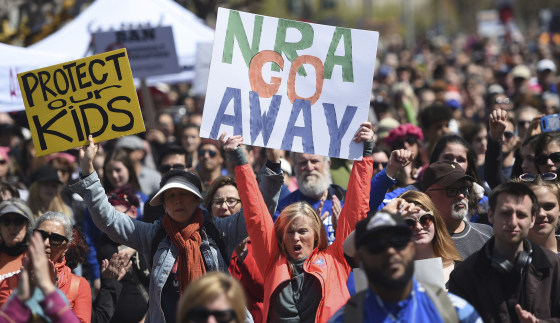The National Rifle Association is fighting back after the city of San Francisco labeled the gun-rights group a “domestic terrorist organization.”
San Francisco’s Board of Supervisors last week passed a resolution that also said the NRA "spreads propaganda that misinforms and aims to deceive the public about the dangers of gun violence."
The group on Monday filed a lawsuit challenging the declaration by San Francisco’s government.
The suit filed in the U.S. District Court for the Northern District of California in San Francisco seeks to have a judge declare that the city government violated the NRA's First Amendment rights of free speech and to award it damages.
Wayne LaPierre, the NRA’s CEO, said in a statement that the lawsuit was also intended to send a message that "we will never stop fighting for our law-abiding members and their constitutional freedoms."
The San Francisco Board of Supervisors' resolution came in the wake of several mass shootings, including the attack at the Gilroy Garlic Festival in late July in which a gunman killed three people, including two children, and wounded others before being shot by police and ultimately killing himself.
San Francisco Supervisor Catherine Stefani told the Associated Press that she drafted the resolution after that shooting. "I had enough," she said.
The resolution says that the city and county of San Francisco should "take every reasonable step to assess the financial and contractual relationships our vendors and contractors have with this domestic terrorist organization" and that the city and county should take every reasonable step to limit those who do business with either from also doing business with the NRA.
The NRA said in its lawsuit the declaration amounts to blacklisting, and it argues that "the government cannot discriminate against citizens based on the viewpoint of their political speech."
Last week, the NRA also criticized a move by Walmart to stop selling ammunition that can be used in military-style weapons and high-capacity magazines and for handguns. The retailer also asked that customers no longer openly carry firearms in its stores.
The retail giant had previously stopped selling weapons like the AR-15, and it stopped selling handguns in all states except Alaska. Among the changes announced last week, the retailer said it would stop selling handguns in that state as well. In February 2018, Walmart announced it was raising the age limit for firearms and ammunition sales to 21.
Walmart CEO Doug McMillon said in a statement announcing the changes last week that it has been seeking to find ways it can help make the country safer and that "it's clear to us that the status quo is unacceptable."
McMillon also called on Congress to strengthen background checks "and to remove weapons from those who have been determined to pose an imminent danger."
"As we’ve seen before, these horrific events occur and then the spotlight fades. We should not allow that to happen. Congress and the administration should act," McMillon said.
The NRA said in response that Walmart had succumbed "to the pressure of the anti-gun elites,” that customers would go elsewhere for ammunition and that "rather than place the blame on the criminal, Walmart has chosen to victimize law-abiding Americans."
Walgreens, Kroger, CVS and Wegmans have also asked shoppers to not openly carry guns in its stores.
Also last week, Texas Lt. Gov. Dan Patrick, a gun-rights defender, told the Dallas Morning News that he wants the state to close a loophole in gun-purchaser background checks involving strangers.
"Look, I'm a solid NRA guy," Patrick told the newspaper, "but not expanding the background check to eliminate the stranger-to-stranger sale makes no sense to me and ... most folks."
The NRA's Institute for Legislative Action on Friday said Patrick's proposals "would resurrect the same broken, Bloomberg-funded failures that were attempted under the Obama administration."
A gunman who killed seven people and injured more than 20 others in a shooting rampage in West Texas on Aug. 31 purchased the gun he used from a private seller, a transaction that does not require a background check, law enforcement officials have told NBC News. The shooter, who was killed by police, failed a background check in 2014 because he had a disqualifying mental health issue, officials have said.

